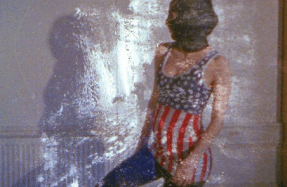
“The problem is that it then goes off on tangents and the plot becomes secondary.”—A Mysterious World
Until recently a somewhat forgotten figure of the New Argentine Cinema, director Rodrigo Moreno has, with The Delinquents, asserted himself as perhaps that movement’s most underestimated talent. Moreno’s first narrative film in nine years is several times more ambitious than anything the 51-year-old filmmaker has yet ventured, a work as sprawling and serpentine as his previous features were compact and unassuming. Just as telling, it’s a grand embrace of fiction following what seemed to be a slow, perhaps unconscious retreat from narrative storytelling.
The director’s two most recent features, the docu-fiction hybrid Reimon (2012) and the observational documentary A Provincial City (2017), marked a distinct tonal shift in Moreno’s work, away from both the sullen existentialism of his solo debut El custodio (2005) and the ironic detachment of A Mysterious World (2011)—two films very much in keeping with prevailing art-cinema trends of the time—and closer to the kind of modest, empathetic portraiture that’s become de rigueur on the non-fiction festival circuit. It’s easy and not entirely inapt, then, to consider a work of such bold, unabashedly cinematic, and purely pleasurable wide-canvas storytelling as The Delinquents—a film that traffics in a little bit of everything Moreno’s done in the past, while nodding to any number of classic and contemporary influences along the way—as something of a re-debut. Not only is it the freshest and most accomplished work of Moreno’s career, it’s also carried aloft at every moment with the joie de vivre of a filmmaker bursting with energy and ideas.
is at once a knowing expansion of the central premise of Hugo Fregonese’s 1949 Argentine noir classic —about a lowly insurance clerk who hatches an embezzlement scam he knows can land him a maximum of seven years in prison, which he proudly serves before returning to retrieve the stashed payload—and a rewiring of its themes of greed and working-class disenchantment. Forging a continuum between eras and traditions by dismantling the codes and signifiers that might otherwise tie its story to a specific period or set of expectations, is perhaps the most languorous, anachronistic heist movie ever made—a genre film in love with the devices and archetypes of genre, but uninterested in the kind of dramatic, moralistic storytelling that typifies your average three-act crime film (which is an admittedly inadequate term for a movie that, by the end, could just as






